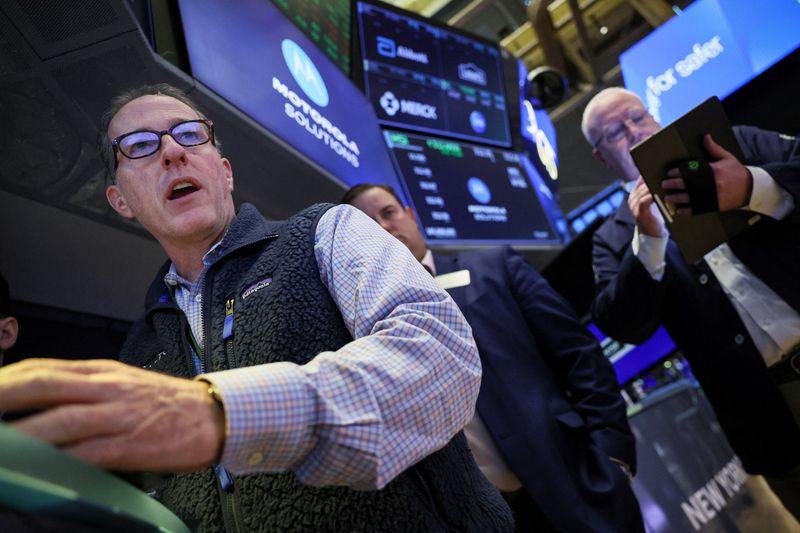By Caroline Valetkevitch
NEW YORK (Reuters) -U.S. stocks ended higher on Wednesday on optimism that the Federal Reserve may be done raising interest rates and that the economy is still resilient.
Economic reports on jobless claims, durable goods, and consumer sentiment seemed to suggest the economy is easing but may stay strong enough to avoid recession.
Data showed the number of Americans filing new claims for unemployment benefits fell more than expected last week.
Tuesday's minutes on the last Fed meeting showed a cautious approach toward monetary policy.
Still, stocks have risen sharply in recent weeks on the view the Fed is done hiking rates.
"Overall you have a solid backdrop to the market," said Quincy Krosby, chief global strategist at LPL Financial (NASDAQ:LPLA) in Charlotte, North Carolina.
"The signals for the market, despite concerns over the economy and consumer spending, is that this market has sustainability in what is probably the most hospitable season for the market."
She said stocks tend to rise just before the U.S. Thanksgiving holiday and also rally heading into year-end. The market will be closed on Thursday for Thanksgiving.
The Dow Jones Industrial Average rose 184.74 points, or 0.53%, to 35,273.03, the S&P 500 gained 18.43 points, or 0.41%, at 4,556.62 and the Nasdaq Composite added 65.88 points, or 0.46%, at 14,265.86.
Big tech-related shares were among those giving the S&P 500 its biggest boost. Communication services rose 0.9%, leading S&P 500 gains in all sectors except for energy, which fell 0.1%.
Among the day's negatives, Nvidia (NASDAQ:NVDA)'s shares fell 2.5%, a day after the chip designer forecast overall fourth-quarter revenue above Wall Street targets, but warned U.S. export curbs could lead to a steep drop in sales in China.
Among other big movers, Deere (NYSE:DE) & Co shares dropped 3.1% after the farm equipment maker forecast 2024 profit below analysts' estimates.
Volume on U.S. exchanges was 8.57 billion shares, compared with the 10.82 billion average for the full session over the last 20 trading days.

Advancing issues outnumbered decliners on the NYSE by a 1.97-to-1 ratio; on Nasdaq, a 1.67-to-1 ratio favored advancers.
The S&P 500 posted 45 new 52-week highs and one new low; the Nasdaq Composite recorded 89 new highs and 104 new lows.